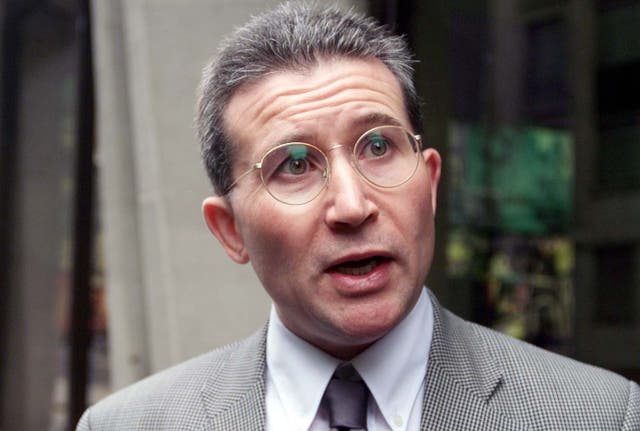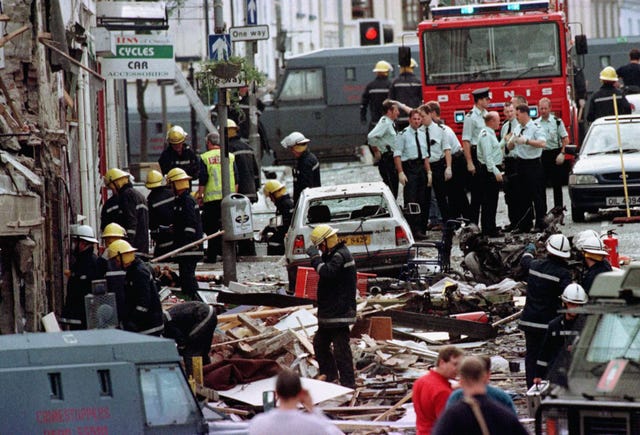Young Omagh victim robbed of ‘life full of possibilities’, inquiry hears
Victor Barker delivered a commemoration of his son James to the Omagh Bombing Inquiry.

A young boy killed in the Omagh bomb was robbed of a “life full of possibilities”, his father has said.
Victor Barker also told the Omagh Bombing Inquiry that he does not believe his daughter has ever recovered from the guilt that her brother James replaced her on a trip to the Co Tyrone town on the day of the massacre.
James Barker was 12 when he was killed in the Real IRA atrocity in 1998.

His father told the inquiry that James had grown up in England, but his maternal grandparents moving to Buncrana in Co Donegal made his wife want to move back to Ireland.
Mr Barker, who stayed in England, said his son loved living there despite missing him.
He told the inquiry he was on a visit to Donegal in August 1998.
Mr Barker said his daughter had been due to go on a trip to Omagh on the Saturday, but had said she was not feeling well and James asked if he could go instead.
He said: “This was the last time I saw my son alive.”
Mr Barker added: “When the news of the Good Friday Agreement appeared to signal the end of the Troubles in Northern Ireland, the feeling of peace at last permeated all around.
“Then fulfilment of my wife’s desire to return to her homeland and to give the children a better life seemed to close to fruition.
“Particularly as James was due to start his education at Campbell College Belfast the following September.”
He continued: “As he left the house that morning he had a life full of possibilities in front of him.
“There is nothing more precious than family time.
“Little did I know that the life he had built and my wife’s dream of a better life for the children was about to be torn apart forever.”
Mr Barker had gone for dinner in Donegal.
He said that in the evening he had been told there had been a “dreadful accident” in Omagh, but he was not aware of a bomb.
Later in the evening Mr Barker received a call from a priest in Buncrana who told him to go to Omagh.

When he reached Omagh Leisure Centre, the inquiry heard, he was asked if his son had any identifying marks on his body.
He was transported overnight to an Army barracks which was being used as a temporary mortuary.
Mr Barker said: “It was at this moment I knew that James was not in hospital.”
He was then asked to identify the body of his son.
Mr Barker said: “Those moments probably play on my mind more than anything.
“I cannot begin to describe what those hours were like… the next few hours were simply hell.”
Mr Barker said he also had to identify the body of the brother of a Spanish exchange student who had been staying with his family.
He added: “We then had to break the news to our daughter. Who was naturally distraught.
“I do not believe she has ever recovered from the feelings of guilt that she should have been in Omagh, and not her brother James.
“The raw emotion of the feeling of helplessness remains as real now as it was then.”
Mr Barker told the inquiry how he picked up a copy of a newspaper the next day where there was a picture of James on the front page.
He said: “He was on a stretcher. I recall saying to my friends, ‘look what they’ve done to my lovely boy’.
“I simply broke down.”
Mr Barker said the funeral of his son in Buncrana was “almost like a state funeral”.
He said: “There was no privacy and a total lack of control for us as a family, which was intolerable in retrospect.”
Mr Barker later had his son’s remains exhumed and brought to England.
He added: “James’s life was full of promise… he was outgoing, caring, a fun-loving child.”
Mr Barker said he continues to endure “some very dark moments”.
He added: “But I have done all I can to bring some kind of justice for James and everyone else.
“We have been woefully let down by a very poorly conducted police investigation and, I might add, a chief constable in Sir Ronnie Flanagan who, in my view, fell well short of the mark.
“The civil case has taken a great deal out of so many families.
“James had his life taken away from him in the most evil and barbaric fashion and he was robbed of his bright and happy future.
“I sometimes doubt whether he has the same human rights as the terrorists.
“We should all remember that pain has no nationality and no borders, but neither does the love of the human heart.”





